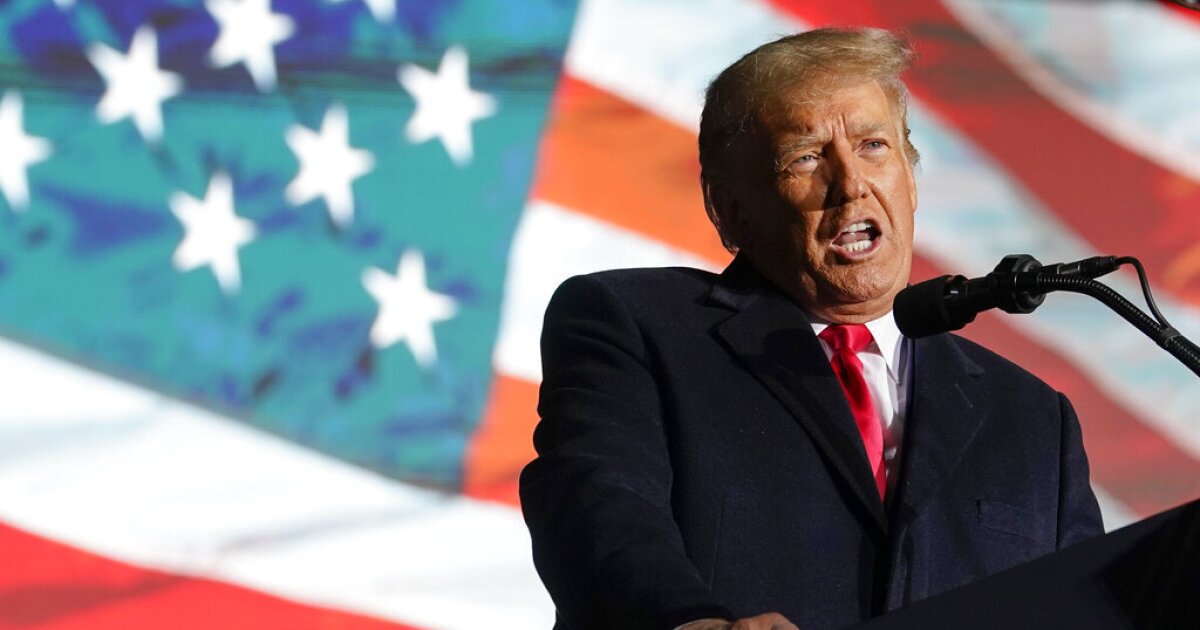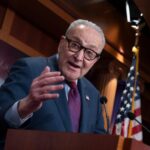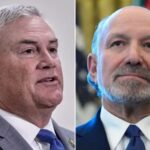

Former President Donald Trump is testing whether Republican voters will reward him for contributing to the party’s success in the midterm elections or penalize him for overshadowing what figures to be a good night for the GOP.
Trump was bursting at the seams to announce his third White House bid, potentially setting up a rematch with President Joe Biden — and stepping on the Republican candidates who are anticipating big wins this week.
‘WE’RE GONNA WIN THIS TIME’: BIDEN PREDICTS DEMOCRATS HOLD CONGRESS
But Trump ultimately refrained from doing so during his rally for Hillbilly Elegy author Senate candidate J.D. Vance (R-OH).
“We want nothing to detract from the importance of tomorrow,” Trump said, adding that despite his two previous runs for president, an “epic” GOP victory is what is needed right now.
The ex-president is also beginning to feud more openly with one of those Republicans: Gov. Ron DeSantis (R-FL), who is expected to win a second term handily and is seen as Trump’s foremost rival for the 2024 GOP presidential nomination.
And yet his Monday night stemwinder included a call for DeSantis’s reelection. Trump endorsed DeSantis in his 2018 gubernatorial primary and has been known to take credit for his success.
If Republicans retake the Senate, Trump-endorsed candidates will play a big role. He backed the winning candidate to emerge from the primaries on the closest races headed into Election Day.
Similarly, if Democrats manage to retain the Senate, Trump’s handpicked candidates will shoulder much of the blame in the GOP finger-pointing sure to ensue in the aftermath.
But a major question is whether Trump’s failure to be a team player consistently hurts him in the run-up to another White House run in a way that it never did during the 2016 Republican primaries and seldom did when he was in office.
Trump’s attacks on the rest of the 2016 GOP field, including former Gov. Jeb Bush (R-FL) of the Bush dynasty and popular conservative figures such as Sens. Ted Cruz (R-TX) and Rand Paul (R-KY), largely served to make his rivals look small. The possibility exists that this time around, by training his fire on an ascendant figure such as DeSantis — whose “DeSanctimonious” nickname Trump would surely like to see join the pantheon alongside “Low Energy Jeb,” “Lyin’ Ted,” and “Crooked Hillary” — he will make himself small instead.
A precedent would be former House Speaker Newt Gingrich, a hero of the 1994 Republican revolution, suggesting during his 2012 presidential campaign that the GOP budget that had been introduced by the future speaker and then-Rep. Paul Ryan (R-WI) was “right-wing social engineering.”
The response was swift. The Wall Street Journal editorial page said, “Gingrich chose to throw his former allies in the GOP House not so much under the bus as off the Grand Canyon rim.” The Journal also accused him of amplifying Democratic messaging, writing, “By using the word ‘radical,’ Mr. Gingrich deliberately chose to echo the liberal critics who want to write the Ryan plan out of respectable political debate.”
Sen. James Lankford (R-OK), then a first-time congressman, quipped, “Typically, you’ll find people in a presidential campaign running against the current president of another party rather than running against his own party.”
But the most damaging response may have come from an Iowa Republican voter who confronted Gingrich about his remarks while the cameras were rolling. “What you just did to Paul Ryan is unforgivable,” the voter told Gingrich as they shook hands. “Why don’t you get out before you make a bigger fool of yourself?”
The angry Republican voter concluded, “You’re an embarrassment to our party.” Gingrich replied, “I’m sorry you feel that way.”
This controversy didn’t end Gingrich’s candidacy, he would go on to win primaries in South Carolina and Georgia, but it took some wind out of his sails. And it highlights the risk for Trump if he finds himself at cross-purposes with a rising star in the party.
There is also the Georgia precedent. Trump’s complaints about the 2020 election, in which he lost the state narrowly and blamed voter fraud, depressed conservative turnout in the two Georgia Senate runoffs afterward. Republicans lost both races by a slim margin and, with it, control of the Senate.
A Republican Senate would have been able to stop both the $1.9 trillion American Rescue Plan and the so-called Inflation Reduction Act, the two reconciliation bills Democrats passed on a partisan basis. It would have also come in handy during the nomination of Supreme Court Justice Ketanji Brown Jackson.
Georgia Republicans tuned out Trump’s primary endorsements in the state this year. They voted overwhelmingly to renominate Gov. Brian Kemp (R-GA) and Secretary of State Brad Raffensperger (R-GA) over Trump-endorsed challengers. Trump had one of his worst endorsement track records in the state.
This suggests a GOP hungry for some wins could easily turn on Trump if he does not deliver them for the party as a whole rather than just himself. Notably, Trump was on team Kemp Monday night.
Biden and the Democrats have tried to make this year’s elections about Trump. Trump has often aided that narrative. Even as he failed to fulfill rumors he would declare for president at the Vance rally, he heavily teased an announcement on Nov. 15 — presumably, for president again.
Trump has diligently campaigned for Republican Senate candidates in an election in which the party only needs a net gain of a single seat to capture the chamber. This has come amid charges that his endorsements depleted the candidate quality necessary to do so, as some of the less experienced Republicans he endorsed in these races struggled out of the gate.
Virtually all of Trump’s endorsees have managed to make a race out of it. Some half a dozen Senate contests are within the margin of error. But Trump’s rallies have also been criticized as being too focused on himself, even as he has traveled to battleground states to appear with Republicans who will be on the ballot this year. Trump’s event promoting Sen. Marco Rubio (R-FL) for a third term generated headlines in no small part due to his exclusion of DeSantis. (Trump’s lieutenants denied it was a snub, pointing out that he has been focused on helping Senate rather than gubernatorial candidates this cycle.)
An early Trump announcement is clearly intended to freeze the Republican field. Many possible contenders will determine they either cannot beat him or his negative campaigning against them would render the nomination worthless if they did.
CLICK HERE TO READ MORE IN THE WASHINGTON EXAMINER
But confident front-runners tend not to declare as early aspirants who need a year or more to build up name recognition.
A new NBC News poll found that 62% of Republicans identified themselves as supporters of the party first, compared to 30% who picked Trump.







